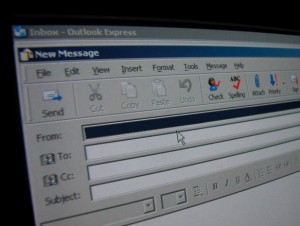We’re all susceptible to scam attempts. Each industry attracts its own type of scammers. Accounts receivable factoring operations to owner/operators, and shipping and transportation companies are no different. Here are a few tips to keep in the back of your mind to minimize being exposed to invoicing scams, or other email scams.

Some emails make it easier to identify that they’re up to no good.
- poor spelling and grammar
- ALL CAPS
- addressed to the wrong person
- addressed generically and to no one in particular at all
While some emails are obvious that they’re trying to trick you into forfeiting some of your hard earned cash, other emails are not as easily identifiable. And scammers are getting creative.
Since you already know the MO of traditional email scams, the scammers are thinking of new ways to trick or “phish” your money from you. For example, did you know that some scammers access company’s websites or intranet and send “company” emails? That’s right. Scammers can send you a real email. This is particularly effective for large companies. The email will look like it came from another internal department. For large companies that don’t know everyone within the building, it’s easy to mistake the email as real. And if the instructions tell payroll to send off a few bucks (unknowingly to scammers), that money is not recoverable.
How does the email scam work?
Savvy scammers can hack into unsecured internet routers. Those routers provide access to the internal network, intranet. Once in, scammers have a good chance to send real emails and encourage recipients to take action and unknowingly participate in their scam. For example, the scammer may send an email that appears to originate from the purchasing department and request that the finance department promptly send payment to a specific “account” (the scammer).
Emails like this may use the name and logo of any company, and use an email address from any domain. Accordingly, the body of the email includes an urgent demand, which is a requirement to secure new, important, and urgent contracts. The urgency and seemingly important content of the email will make the unsuspecting email recipient post the payment using an unconventional method that is prompt and likely unrecoverable once the scammer receives the deposit.
Some reports state that this type of email scam nets an average of $5,000 to $10,000 per haul. How do scammers game the system so easily? They secure information from company websites, directories and other publicly available resources. And with fair hacking skills, they can access your company’s email system, thus making it look like the email came from within the company and use the identity or info public on the company website or directory. Unless the demand seems completely unusual or outrageous, no one would know the difference.
How can you protect yourself from email scams?
Here are some suggestions to help you avoid becoming a victim of email scams.
- Be cautious, always. Receiving emails urgently prompting you to send cash or bank transfers should be a cause for alarm. Be cautious even though the email may have originated from within your company.
- If you received an email from another department that demands payment or one that prompts you to enter sensitive financial information, confirm it via phone or in-person with the requesting party.
- Stick to procedures or standard operating processes. Procedures are set in place for a reason and receiving a request for an unconventional method of payment should raise a red flag.
- Clicking on the links of a doubtful email may lead you to a phishing website or it may give your computer a virus that would enable scammers to access your data or accounts. When in doubt, don’t click.
- Minimize the chances that your email account can be compromised. Make sure that your password is strong, at least eight unique characters long, contains a combination of lower and upper case, and include symbols and numbers.
